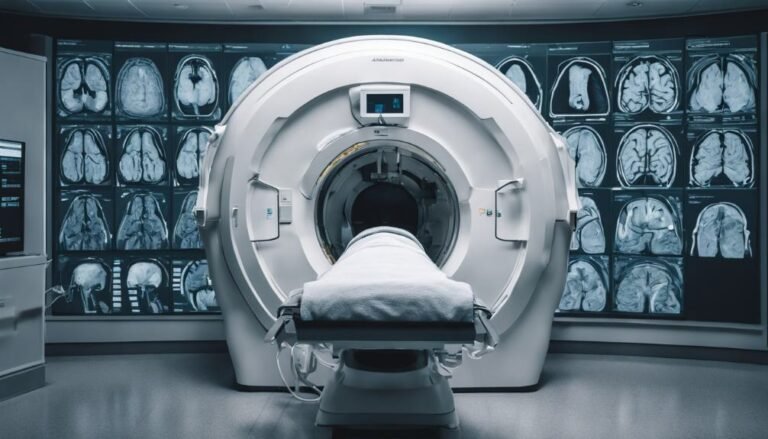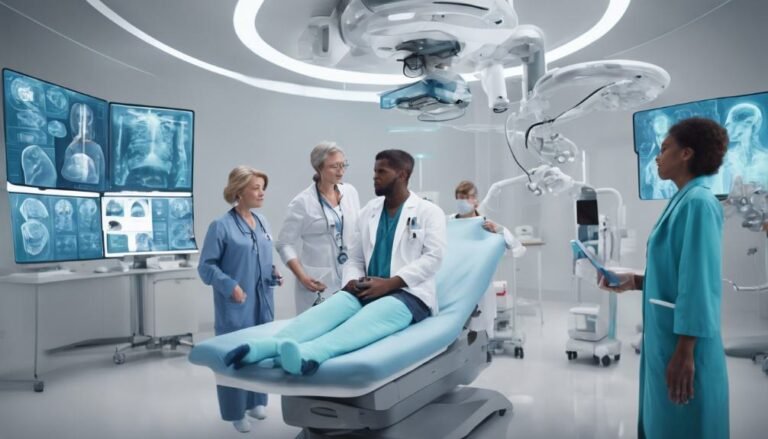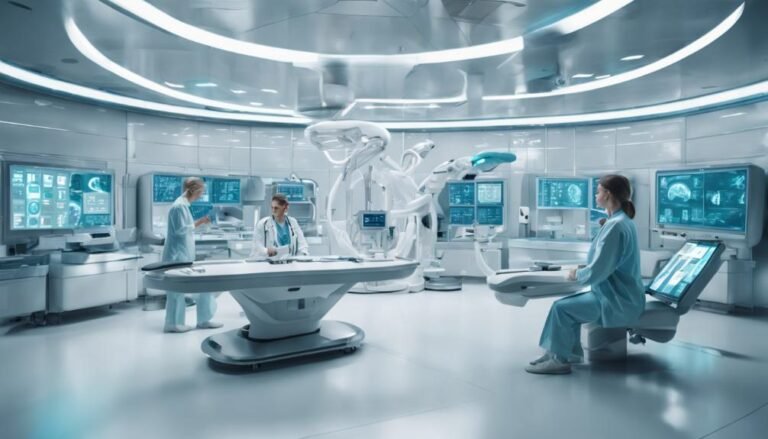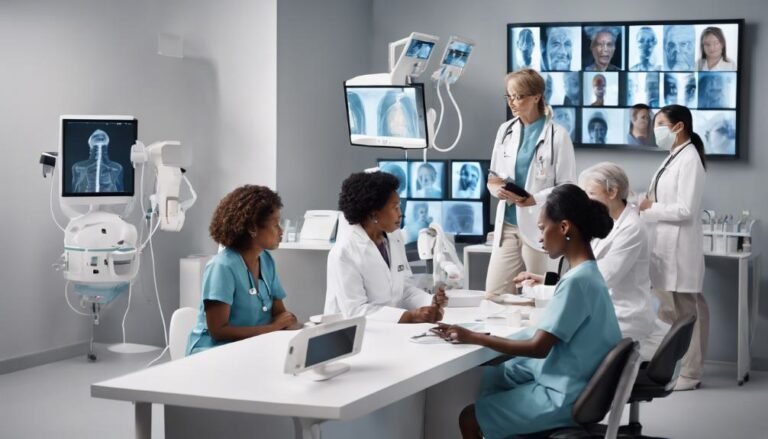AI for Allied Health Professional Training
Embracing AI in allied health professional training opens doors to a world of innovative learning methods and enhanced skill development opportunities. Imagine a scenario where artificial intelligence tailors training to your individual needs, providing real-time feedback and immersive experiences that refine your clinical acumen. As you navigate the complexities of healthcare education, AI stands as a silent partner, guiding you towards a future where proficiency meets precision. Want to explore how this collaboration between technology and healthcare is reshaping the landscape of allied health education?
Key Takeaways
- AI enhances personalized learning paths for allied health professionals.
- Virtual simulations aid in practical skills practice and application.
- AI-powered assessment tools offer accurate performance evaluations.
- Advanced AI improves clinical decision-making skills through simulations.
- AI overcomes training challenges by providing tailored feedback and performance tracking.
Evolution of AI in Healthcare Education
With the rapid advancements in technology and the increasing demand for efficient healthcare training, the integration of AI in healthcare education has greatly evolved over the past decade. AI integration has brought about a significant educational transformation in the way healthcare professionals are trained. Institutions are leveraging AI to enhance learning experiences, streamline processes, and improve outcomes.
AI integration in healthcare education has revolutionized traditional teaching methods by offering personalized learning experiences tailored to individual needs. Through the analysis of vast amounts of data, AI algorithms can identify areas where students may need additional support, allowing for a more targeted approach to education. This personalized learning path enhances student engagement and knowledge retention.
Furthermore, AI-powered simulations and virtual reality environments provide hands-on training opportunities that were previously inaccessible. These tools offer a safe space for students to practice skills and procedures, ultimately improving competency and confidence in real-world healthcare settings.
The evolution of AI in healthcare education marks a significant shift towards more effective, efficient, and engaging learning experiences for aspiring healthcare professionals.
Personalized Learning Paths
The integration of AI in healthcare education has facilitated the development of personalized learning paths tailored to individual needs, marking a significant advancement in training methodologies for allied health professionals. Through AI-powered platforms, allied health professionals can now benefit from adaptive curriculum structures that adjust based on their learning pace and preferences. This tailored education approach guarantees that each professional receives content relevant to their current knowledge level, optimizing the learning process.
Moreover, AI enables the provision of individualized feedback, offering precise insights into areas of strength and improvement. This feedback mechanism allows allied health professionals to address their weaknesses effectively, leading to enhanced skill development and knowledge retention.
Additionally, personalized progress tracking is a key feature of AI-driven learning paths. Professionals can monitor their advancement, set goals, and track their performance metrics, fostering a sense of achievement and motivation.
Virtual Simulations for Skills Practice
Virtual simulations offer allied health professionals a dynamic and immersive environment for honing their skills through realistic practice scenarios. These simulations provide immersive experiences that closely mimic real-world settings, allowing you to engage in hands-on practice without physical constraints.
In a time where remote learning is increasingly prevalent, these interactive scenarios become invaluable tools for honing your skills from anywhere in the world. By leveraging virtual simulations, you can actively participate in scenarios that require critical decision-making, diagnostic skills, and patient interactions.
The interactive nature of these simulations enables you to apply theoretical knowledge in practical situations, fostering a deeper understanding of complex concepts. Additionally, the feedback mechanisms embedded within these simulations provide real-time insights into your performance, allowing you to identify areas for improvement and track your progress over time.
AI-Powered Assessment Tools
AI-Powered Assessment Tools revolutionize the evaluation process by utilizing advanced algorithms to analyze performance data efficiently and accurately. These tools enable data-driven evaluations, providing valuable insights into the skill mastery tracking of allied health professionals. By leveraging AI technology, these assessment tools offer adaptive feedback tailored to individual proficiency levels, fostering continuous learning and improvement.
One key benefit of AI-powered assessment tools is the ability to generate detailed performance analytics in real-time. These analytics go beyond conventional assessment methods, offering a thorough overview of strengths and areas needing improvement. With this data at your fingertips, you can make informed decisions to enhance your training strategies and optimize learning outcomes.
Moreover, AI-powered assessment tools streamline the evaluation process, saving time and resources while ensuring a more objective assessment of competencies. By incorporating these innovative tools into allied health professional training programs, institutions can elevate the quality of education and better prepare future healthcare providers for the challenges they'll face in their careers.
Enhancing Clinical Decision-Making Skills
By integrating advanced simulation technology into training curriculums, allied health professionals can enhance their clinical decision-making skills through realistic scenario-based practice. Case studies provide a valuable platform for analyzing complex patient scenarios, allowing you to apply theoretical knowledge to practical situations.
Through data analysis of these cases, you can identify trends, patterns, and best practices, honing your ability to make informed decisions in real-world healthcare settings.
Cognitive training within these simulations challenges you to think critically, evaluate multiple variables, and prioritize actions effectively. The feedback loop offered by AI algorithms can pinpoint areas for improvement, guiding you towards refining your decision-making processes.
Addressing Healthcare Disparities
You can leverage AI to analyze healthcare data and identify disparities in access and outcomes, paving the way for targeted interventions.
By integrating equity considerations into training programs, allied health professionals can better understand and address the root causes of disparities.
Evaluating the impact of training on reducing healthcare inequities is essential for shaping a more inclusive and effective healthcare system.
Equity in Healthcare
Addressing healthcare disparities is a critical challenge that demands innovative solutions and data-driven strategies to guarantee equity in healthcare for all individuals.
Disparities in healthcare access are often rooted in social determinants such as income level, education, and geographic location. Data-driven approaches can help identify these disparities and target interventions effectively.
Innovative technologies, like AI, have the potential to bridge these gaps by providing personalized healthcare solutions and improving access to care. AI can analyze vast amounts of data to identify at-risk populations, predict health outcomes, and optimize resource allocation in underserved communities.
Training Impact Assessment
To assess the impact of training on addressing healthcare disparities, data-driven evaluation methods can provide valuable insights into the effectiveness of allied health professional programs in improving equitable access to healthcare.
Performance evaluation and outcome assessment are vital components in determining the success of training programs in reducing healthcare disparities. By analyzing metrics such as patient outcomes, satisfaction levels, and provider competency, the training effectiveness and skill development can be quantitatively measured.
Through rigorous assessment, healthcare organizations can identify areas of improvement in their training programs, leading to more targeted interventions and ultimately better outcomes for underserved populations.
Evaluating the impact of training on addressing healthcare disparities also allows for the identification of gaps in knowledge or skills that may contribute to inequities in healthcare delivery. By leveraging data-driven insights, allied health professionals can continuously enhance their training programs to make sure they're effectively equipping providers with the skills necessary to deliver high-quality care to all individuals, regardless of background or circumstance.
Overcoming Training Challenges With AI
By harnessing the power of artificial intelligence, numerous challenges in allied health professional training can be effectively overcome. AI offers solutions for skill transferability and continuous improvement by providing personalized learning experiences tailored to individual needs. Through advanced algorithms, AI systems can analyze trainee performance data to identify strengths and weaknesses, allowing for targeted skill development and enhancing overall competency.
Feedback optimization is another key area where AI excels in allied health training. By utilizing natural language processing and machine learning, AI can provide real-time feedback on clinical tasks, communication skills, and decision-making processes. This immediate and objective feedback loop enables trainees to make necessary adjustments and improve their performance quickly.
Furthermore, AI facilitates performance tracking by collecting and analyzing vast amounts of training data. This data-driven approach allows educators to monitor progress, identify trends, and adapt training strategies accordingly.
Future Trends in Allied Health Education
Harnessing the advancements in artificial intelligence, the future of allied health education is poised to revolutionize training methodologies and enhance professional development. Technological advancements are paving the way for personalized learning experiences tailored to individual student needs. AI algorithms can analyze vast amounts of data to identify areas where students may need additional support, allowing educators to adapt curriculum development in real-time.
Furthermore, industry partnerships are becoming increasingly important in shaping allied health education to guarantee workforce readiness. Collaborating with healthcare organizations can provide valuable insights into the skills and knowledge needed in the field, guiding the development of relevant training programs.
Conclusion
To sum up, AI is reshaping allied health professional training with personalized learning paths, virtual simulations, and AI-powered assessment tools. By harnessing the power of AI, professionals can enhance their clinical decision-making skills, overcome training challenges, and address healthcare disparities.
The future of allied health education is bright, with continuous improvements and industry partnerships driving innovation. Remember: 'The only way to do great work is to love what you do.' – Steve Jobs







